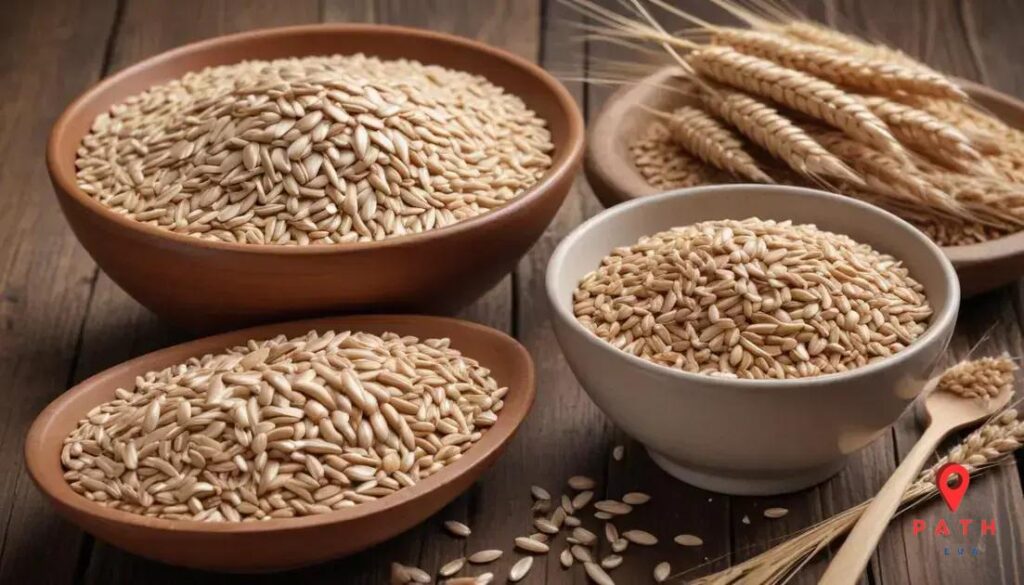Whole vs refined grains: which is better for your health?

Anúncios
Whole grains provide essential nutrients and fiber, making them a healthier choice compared to refined grains, which often lack nutritional value and can affect blood sugar levels.
Whole vs refined grains is a topic that often puzzles many of us. Have you ever wondered how these grains affect your health? Let’s explore the differences and benefits of each.
| Aspect | Whole Grains | Refined Grains |
|---|---|---|
| Nutrition | Rich in fiber, B vitamins, and minerals | Stripped of fiber and nutrients during processing |
| Health Benefits | Supports digestion and heart health | May increase risk of diabetes and obesity |
| Blood Sugar | Helps stabilize blood sugar levels | Causes rapid spikes in blood sugar |
| Diet Use | Great for balanced, long-term health | Best consumed in moderation |
| Examples | Brown rice, quinoa, oats, barley | White bread, white rice, pastries |
Understanding whole grains and their benefits
Understanding whole grains can significantly impact your health. Whole grains are minimally processed and contain all parts of the grain kernel, making them rich in nutrients.
These grains are known to provide essential vitamins, minerals, and fiber. Unlike refined grains, they maintain their nutritional benefits and can promote better digestion and heart health.
Benefits of Whole Grains
- Whole grains can help lower the risk of heart disease.
- They aid in weight management by keeping you fuller longer.
- Whole grains have been linked to a lower risk of type 2 diabetes.
Incorporating whole grains into your diet is easy! You can choose options like brown rice, quinoa, and whole wheat bread. For more information on the benefits of whole grains, visit the USDA’s MyPlate website.
Anúncios
The drawbacks of refined grains
Refined grains are often stripped of their nutrients during processing. Unlike whole grains, they can lack essential vitamins and minerals.
These grains are commonly found in many favorite foods, such as white bread and pastries, but they may not be the healthiest choice.
Drawbacks of Refined Grains
- They can cause quick spikes in blood sugar levels.
- Refined grains often lead to lower fiber intake.
- Regular consumption may increase the risk of obesity and heart disease.
To maintain a balanced diet, it’s wise to limit refined grains and opt for whole grains instead. For more detailed information on grain choices, check the Harvard T.H. Chan School of Public Health.
How to incorporate whole grains into meals

Incorporating whole grains into your meals is easier than you think! Whole grains can enhance both the taste and nutritional value of your dishes.
Making simple swaps in your daily diet is a great start. Here are a few ideas to consider:
Ways to Add Whole Grains
- Replace white rice with brown rice or quinoa in stir-fries and salads.
- Use whole grain pasta instead of regular pasta for a healthier version of your favorite dishes.
- Opt for whole grain bread for sandwiches or toast.
Cooking a variety of whole grains can also keep your meals interesting. Try experimenting with barley, farro, or bulgur to introduce new flavors. For more tips on whole grain incorporation, visit the Academy of Nutrition and Dietetics.
Nutritional comparison: Whole vs refined
A good understanding of the nutritional comparison between whole grains and refined grains is key to making healthier food choices. Whole grains retain their bran and germ, which provide essential nutrients.
Refined grains, on the other hand, often lose valuable vitamins and minerals during processing.
Nutritional Differences
- Whole grains are rich in dietary fiber, while refined grains have much less fiber.
- They provide higher levels of B vitamins, iron, magnesium, and antioxidants.
- Whole grains can help improve digestion, lower cholesterol levels, and reduce the risk of chronic diseases.
Choosing whole grains over refined grains can boost your overall health. For more detailed information on the nutritional benefits, check the Nutrition.gov website.
Exploring popular whole grain options
Exploring popular whole grain options can help you make better choices for your diet. Whole grains are not only nutritious but also versatile in cooking.
Incorporating these grains into your meals can be both enjoyable and beneficial.
Top Whole Grain Choices
- Brown Rice: A great side dish or base for stir-fries and salads.
- Quinoa: A protein-rich grain that works well in salads, bowls, and as a side.
- Oats: Perfect for breakfast or baking, oats are high in fiber.
- Barley: A chewy grain that can be added to soups and stews.
These are just a few options to consider. For more on various whole grains and their uses, visit the Whole Grains Council website.
In summary, understanding grains is essential for good health
Whether you choose whole grains or refined grains, knowing the differences is important. Whole grains offer more nutrients and health benefits compared to refined grains, which are often processed and lacking in fiber.
Incorporating whole grains into your meals is easy and enjoyable, allowing you to explore various options like quinoa, brown rice, and oats.
By making simple changes to your diet and focusing on whole grains, you can improve your overall health and well-being. So take the time to choose wisely and enjoy the benefits of nutritious grains.




